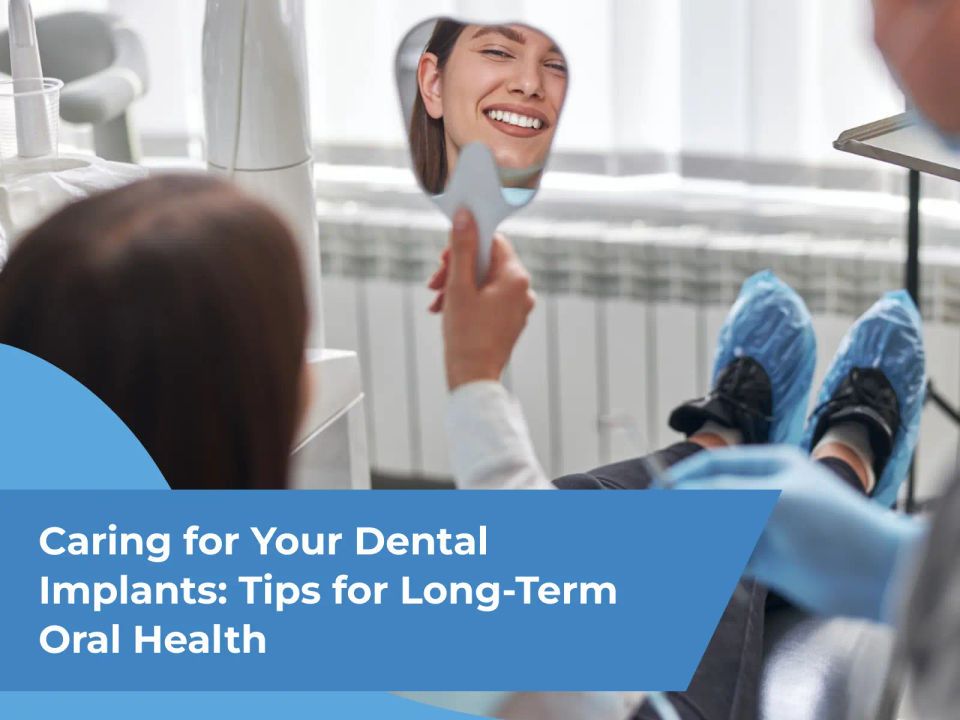
Caring for Your Dental Implants: Tips for Long-Term Oral Health
2024-04-03
Dental implants are a great solution for replacing missing teeth and improving oral health. However, like other dental procedures, they require proper care and maintenance for long-term success. Neglecting oral health with dental implants can lead to complications and issues, such as infections, gum disease, or implant loss.
But how do you care for dental implants? This comprehensive guide by our Glendale dentist, Dr. Leo Aghajanian, offers essential tips to guarantee the long-term success of dental implants for Californian patients and the general public. It also includes nutrition recommendations and insights into maintaining excellent oral hygiene. All the strategies will help you safeguard your beautiful smile.
Avoiding Damaging Habits
Certain habits can compromise the integrity of your dental implants. It is essential to avoid behaviors that could damage your implants and cause them to fail prematurely. Using your teeth to open packages, crack nuts, or perform similar tasks is dangerous and can lead to chipping or breakage of your implant crowns or bridges. Always use the designated tools for these activities to avoid damage.
Smoking has been linked to a higher risk of dental implant failure due to the reduction in blood circulation and oxygen delivery to the tissues supporting the implant. If you are a smoker, consider quitting or at least reducing your tobacco use to support the longevity of your implants.
Proper Oral Hygiene Practices
Brushing Your Implants
Dental implants consist of a titanium post surgically placed into the jawbone, acting as a replacement root for the missing tooth. This post then fuses with the jawbone over time, creating a strong and stable foundation for placing an artificial tooth or crown on top. Neglecting their maintenance can result in complications such as infection, implant failure, or damage to surrounding teeth and gums.
You can start using a soft-bristle toothbrush and be sure to gently brush around the entire implant, including the gumline, to remove plaque and food particles that can lead to bacteria buildup. Various toothpaste options are available for cleaning dental implants, including regular fluoride and specialized implant-specific toothpaste. It is best to consult your dentist in Glendale, Dr. Leo Aghajanian, to determine the most suitable option for your implants and oral health needs.
Various toothpaste options are available for cleaning dental implants, including regular fluoride and specialized implant-specific toothpaste. It is best to consult your dentist in Glendale, Dr. Leo Aghajanian, to determine the most suitable option for your implants and oral health needs.
Flossing Technique
Flossing around dental implants requires a special technique. Thread or tape floss is ideal for reaching the space beneath the implant crown. A floss threader or a water flosser helps make this process easier, ensuring you clean areas that may be hard to reach with standard floss. Also, In addition to floss and brushes, consider incorporating interdental brushes or soft picks into your hygiene regimen. These tools are designed to clean the areas between teeth and implants, removing plaque and food particles.
Regular Dental Check-Ups
Frequent visits every 6 months to your dentist in Glendale at Precision Dental, Dr. Leo Aghajanian, is critical for monitoring the health of your dental implants. He can identify potential issues early and provide treatment before they escalate, saving you from discomfort and the potential for more extensive procedures.
During these regular check-ups, we can also perform regular cleanings that will help remove any plaque or tartar buildup that regular brushing and flossing may miss, contributing to the prevention of oral diseases.
Nutrition and Dental Implants
A balanced diet is important for oral health, particularly for individuals with dental implants. Nutrients like calcium, vitamin D, and vitamin C are vital for the health of teeth and bones. Vitamin C supports the immune system to fight off infections and promotes collagen production for tissue health. In addition, try to Incorporate more dairy, leafy greens, and fortified foods in your diet for calcium and vitamin D. Fresh fruits and vegetables are excellent sources of vitamin C.
Common Issues and Solutions
Even with meticulous care, issues can arise long after a dental implant procedure. Being vigilant and knowing how to recognize and address these problems can make all the difference in your implant's lifetime.
Watch out for red, swollen, bleeding gums, persistent bad breath, shifting or loosening of the implant, pain or discomfort, or unusual sensations. These could be signs of an issue that warrants immediate dental attention. More often than not, early intervention can rectify the problem without invasive procedures. Many dental practices, such as Precision Dental, offer emergency services for urgent dental issues. Save our contact information and know the steps to take in an implant-related emergency.
Your dental implants are a significant investment in your smile and your health. By adhering to appropriate dental care, good nutrition, and avoiding bad habits, you can ensure dental implants remain a part of your life for years. Professional guidance and regular check-ups are as crucial as your daily homecare routine. At Precision Dental, we are committed to helping our patients in Glendale and the surrounding areas enjoy the full benefits of their dental implants. If you'd like to learn more about our services or schedule a consultation, do not hesitate to reach out. Your smile deserves the best, and we are here to provide it.